-
ORIGINAL ARTICLE12-13-2024
Nurses’ experience regarding patient safety in mobile pre-hospital care
Revista Brasileira de Enfermagem. 2024;77(5):e20230529
Abstract
ORIGINAL ARTICLENurses’ experience regarding patient safety in mobile pre-hospital care
Revista Brasileira de Enfermagem. 2024;77(5):e20230529
DOI 10.1590/0034-7167-2023-0529
Views0See moreABSTRACT
Objectives:
to understand nurses’ experience regarding patient safety in mobile pre-hospital care.
Method:
a qualitative, exploratory and descriptive study, conducted with nurses active in mobile pre-hospital care services. Semi-structured interviews were conducted, audio-graved and submitted to Bardin’s content analysis.
Results:
from four thematic categories established, nurses reported the care and management skills necessary to work in this service. They demonstrated a commitment to ensuring safe care for patients, staff and spectators. They highlighted the actions taken to prevent and mitigate incidents. However, they based their experiences on practice protocols and individual actions, expressing the need to improve knowledge about patient safety.
Final Considerations:
mobile pre-hospital care nurses’ experience in relation to patient safety was limited, suggesting the need for training on the subject, alignment of work processes and implementation of strategies, aiming to guarantee safe care.
-
ORIGINAL ARTICLE12-13-2024
Repercussions of the pandemic on tuberculosis control actions from the perspective of health professionals
Revista Brasileira de Enfermagem. 2024;77(5):e20230477
Abstract
ORIGINAL ARTICLERepercussions of the pandemic on tuberculosis control actions from the perspective of health professionals
Revista Brasileira de Enfermagem. 2024;77(5):e20230477
DOI 10.1590/0034-7167-2023-0477
Views0See moreABSTRACT
Objectives:
to analyze the repercussions of the COVID-19 pandemic on tuberculosis control actions from the perspective of primary health care professionals.
Methods:
this descriptive study with a qualitative approach was conducted from November 2022 to April 2023, using semi-structured interviews with 11 key informant professionals from primary health care units in a Brazilian capital. Data were organized using Atlas.ti 22.0 software and subjected to thematic-categorical content analysis.
Results:
the pandemic scenario caused alterations in the work process, necessitating abrupt adaptations, and led to detrimental impacts on the health of professionals and tuberculosis control actions, which were reduced or discontinued.
Final Considerations:
there was evident unpreparedness and a lack of resources from various governmental levels and health services to handle the public health emergency situation without severe harm to the provision of essential services.
-
Training of Brazilian indigenous nurses: between human rights, valuing diversity and inclusion
Revista Brasileira de Enfermagem. 2024;77(5):e20230430
Abstract
Training of Brazilian indigenous nurses: between human rights, valuing diversity and inclusion
Revista Brasileira de Enfermagem. 2024;77(5):e20230430
DOI 10.1590/0034-7167-2023-0430
Views0See moreABSTRACT
Objectives:
to analyze the possibilities and potential of training indigenous nurses, given the Brazilian Health System (SUS), understanding the relationships between education and health.
Methods:
theoretical-reflective study, based on scientific literature, aligned with the experience, critical thinking of its authors and the Sustainable Development Goals in Brazil.
Results:
this text articulates three axes: Potential for including indigenous students in nursing training; Paths to achieving equity through inclusion and retention policies for indigenous students at different levels; and Implications of this for the SUS and global health.
Final Considerations:
indigenous students, beneficiaries of affirmative actions, face challenges of inclusion and retention in public universities that directly impact their academic training. Added to this are the difficulties identified in basic education, professor training and implementation of permanence policies, with consequences for services and training at other levels.
-
ORIGINAL ARTICLE12-13-2024
Interobserver agreement in Reception and Risk Stratification in Obstetrics implementation
Revista Brasileira de Enfermagem. 2024;77(5):e20230361
Abstract
ORIGINAL ARTICLEInterobserver agreement in Reception and Risk Stratification in Obstetrics implementation
Revista Brasileira de Enfermagem. 2024;77(5):e20230361
DOI 10.1590/0034-7167-2023-0361
Views0See moreABSTRACT
Objectives:
to analyze interobserver agreement in the Reception and Risk Stratification in Obstetrics protocol implementation.
Methods:
a cross-sectional study carried out during Reception and Risk Stratification in Obstetrics implementation, conducted in a tertiary hospital in southern Brazil with 891 participants in January 2020. Descriptive and interobserver agreement analysis was carried out using the Kappa coefficient in the risk stratification assigned by the triage nurse and reviewed by the researcher.
Results:
around half of the calls (55.6%) were stratified as not very urgent (green), followed by urgent (yellow) (31.8%), very urgent (orange) (9.3%), not urgent (blue) (3.4%) and no emerging stratification (red). Agreement analysis of revised stratification found Kappa values of 0.20 (blue), 0.54 (green), 0.77 (yellow) and 0.80 (orange).
Conclusions:
most appointments were non-urgent. The agreement analysis between the revised and assigned risk stratification revealed greater interobserver agreement as the priority level increased.
-
ORIGINAL ARTICLE12-13-2024
Adaptation and implementation of a Nursing care protocol for children in the Amazon Region
Revista Brasileira de Enfermagem. 2024;77(5):e20230245
Abstract
ORIGINAL ARTICLEAdaptation and implementation of a Nursing care protocol for children in the Amazon Region
Revista Brasileira de Enfermagem. 2024;77(5):e20230245
DOI 10.1590/0034-7167-2023-0245
Views0See moreABSTRACT
Objectives:
to describe the process of implementing an adapted protocol for pediatric nursing care in a health unit located in a municipality in the Amazon Region.
Methods:
methodological research conducted in a basic health unit with four family health teams in the state of Rondônia, involving seven nursing professionals. Data collection occurred between October 2020 and April 2022, following the research phases: situational diagnosis, exploratory phase, protocol definition, implementation, and evaluation.
Results:
the outcome was the adaptation and implementation of a nursing care protocol for children.
Final Considerations:
the adaptation and implementation process can be an effective approach to improving care, strengthening nursing as a profession with a solid foundation in scientific and clinical evidence. This facilitates early problem identification and appropriate guidance, leading to better health outcomes for children.
-
ORIGINAL ARTICLE12-13-2024
Nurses’ experiences in caring for people with mental health problems hospitalized due to clinical comorbidities
Revista Brasileira de Enfermagem. 2024;77(5):e20230136
Abstract
ORIGINAL ARTICLENurses’ experiences in caring for people with mental health problems hospitalized due to clinical comorbidities
Revista Brasileira de Enfermagem. 2024;77(5):e20230136
DOI 10.1590/0034-7167-2023-0136
Views0See moreABSTRACT
Objectives:
to understand nurses’ experiences in caring for people with mental health problems hospitalized due to clinical comorbidities in non-psychiatric Inpatient Units.
Methods:
qualitative study, guided by Alfred Schutz’s social phenomenology. Sixteen phenomenological interviews were conducted. The content was analyzed and discussed based on the literature, through the composition of three categories of analysis.
Results:
three categories emerged in the study: Challenges in care faced by nurses; Fragmented care action; and Ideal care. The disarticulation of the clinic was revealed, as described by nurses, showing care as an action far removed from the comprehensiveness of a person. Nurses’ performance is guided predominantly by biomedical reference, disregarding appreciation of subjectivity.
Final Considerations:
it was observed that nurses attribute the responsibility for patient care to factors external to their life-world, when, in fact, these aspects should be components that help them in comprehensive care construction.
-
REVIEW11-29-2024
Assessment of knowledge in oncology about care for transgender people: a scoping review
Revista Brasileira de Enfermagem. 2024;77:e20230532
Abstract
REVIEWAssessment of knowledge in oncology about care for transgender people: a scoping review
Revista Brasileira de Enfermagem. 2024;77:e20230532
DOI 10.1590/0034-7167-2023-0532
Views0ABSTRACT
Objective:
to identify evidence available in the literature on instruments and methodologies used to assess healthcare professionals’ knowledge about cancer care for the transgender population.
Methods:
a scoping review was conducted in seven databases, including studies that answered the question: what is the healthcare professionals’ level of knowledge about cancer care for the transgender population?
Results:
forty-one articles were selected that dealt specifically with healthcare professionals’knowledge in relation to care for the LGBTQIAPN+ population, especially the transgender population. Eighteen studies assessed patients’ perceptions of professionals’knowledge, whereas other studies used their own assessment tools, considering the global context of LGBTQIAPN+ health.
Conclusions:
there is no tested and validated instrument that assesses the knowledge about the transgender population’s oncological health, highlighting the need to construct and validate an instrument focused on this population’s needs.
Keywords:Health Services for Transgender PeopleNeoplasmsOncologyProfessional TrainingTransgender PeopleSee more
-
RESEARCH01-01-2017
Violence against children and adolescents: the perspective of Primary Health Care
Revista Brasileira de Enfermagem. 2017;70(3):511-518
Abstract
RESEARCHViolence against children and adolescents: the perspective of Primary Health Care
Revista Brasileira de Enfermagem. 2017;70(3):511-518
DOI 10.1590/0034-7167-2016-0471
Views0See moreABSTRACT
Objective:
To analyze the care provided by Basic Health Units (BHU) to families involved in domestic intrafamily violence against children and adolescents.
Method:
Qualitative research, based on the Paradigm of Complexity. Data collection was performed with 41 professionals through focus groups and semi-structured interviews.
Results:
The following categories emerged from data analysis: ‘Everything comes here’, which reflects the legitimate place of BHUs for the population and the actions taken to build care for families; and ‘We only do what is really necessary’, which brings the look to violence still based on the positivist and biomedical paradigm.
Final considerations:
The model of understanding and construction of work processes in the BHU is structured in the aforementioned paradigm. Nurses have the possibility to become agents of change, both in professionals’ training and in the care thought and provided to communities.
-
RESEARCH01-01-2017
Integrality of care: challenges for the nurse practice
Revista Brasileira de Enfermagem. 2017;70(3):504-510
Abstract
RESEARCHIntegrality of care: challenges for the nurse practice
Revista Brasileira de Enfermagem. 2017;70(3):504-510
DOI 10.1590/0034-7167-2016-0380
Views0See moreABSTRACT
Objective:
to understand the role of the nurse in the collegiate management model of a teaching hospital, in the integrality of care perspective.
Method:
a single case study with multiple units of analysis, with the theoretical proposition “integrality of care is a result of the care offered to the user by multiple professionals, including the nurse”. Data were obtained in a functional unit of a teaching hospital through interviews with 13 nurses in a non-participant observation and document analysis.
Results:
from the analytical categories emerged subcategories that allowed understanding that the nurse promotes integrality of care through nursing management, team work and integration of services.
Final considerations:
the theoretical proposition was confirmed and it was verified that the nursing management focus on attending to health care needs and is a strategy to provide integrality of care.
-
RESEARCH01-01-2017
Low completion rate of hepatitis B vaccination in female sex workers
Revista Brasileira de Enfermagem. 2017;70(3):489-494
Abstract
RESEARCHLow completion rate of hepatitis B vaccination in female sex workers
Revista Brasileira de Enfermagem. 2017;70(3):489-494
DOI 10.1590/0034-7167-2016-0567
Views0See moreABSTRACT
Objective:
to assess predictive factors for noncompletion of the hepatitis B vaccination schedule in female sex workers in the city of Teresina, Northeastern Brazil.
Method:
402 women were interviewed and, for those who did not wish to visit specialized sites, or did not know their hepatitis B vaccination status, the vaccine was offered at their workplaces. Bi- and multivariate analyses were performed to identify potential predictors for noncompletion of the vaccination schedule.
Results:
of the 284 women eligible for vaccination, 258 (90.8%) received the second dose, 157/258 (60.8%) and 68/258 (26.3%) received the second and third doses, respectively. Working at clubs and consuming illicit drugs were predictors for noncompletion of the vaccination schedule.
Conclusion:
the high acceptability of the vaccine’s first dose, associated with low completion rates of the vaccination schedule in sex workers, shows the need for more persuasive strategies that go beyond offering the vaccine at their workplaces.
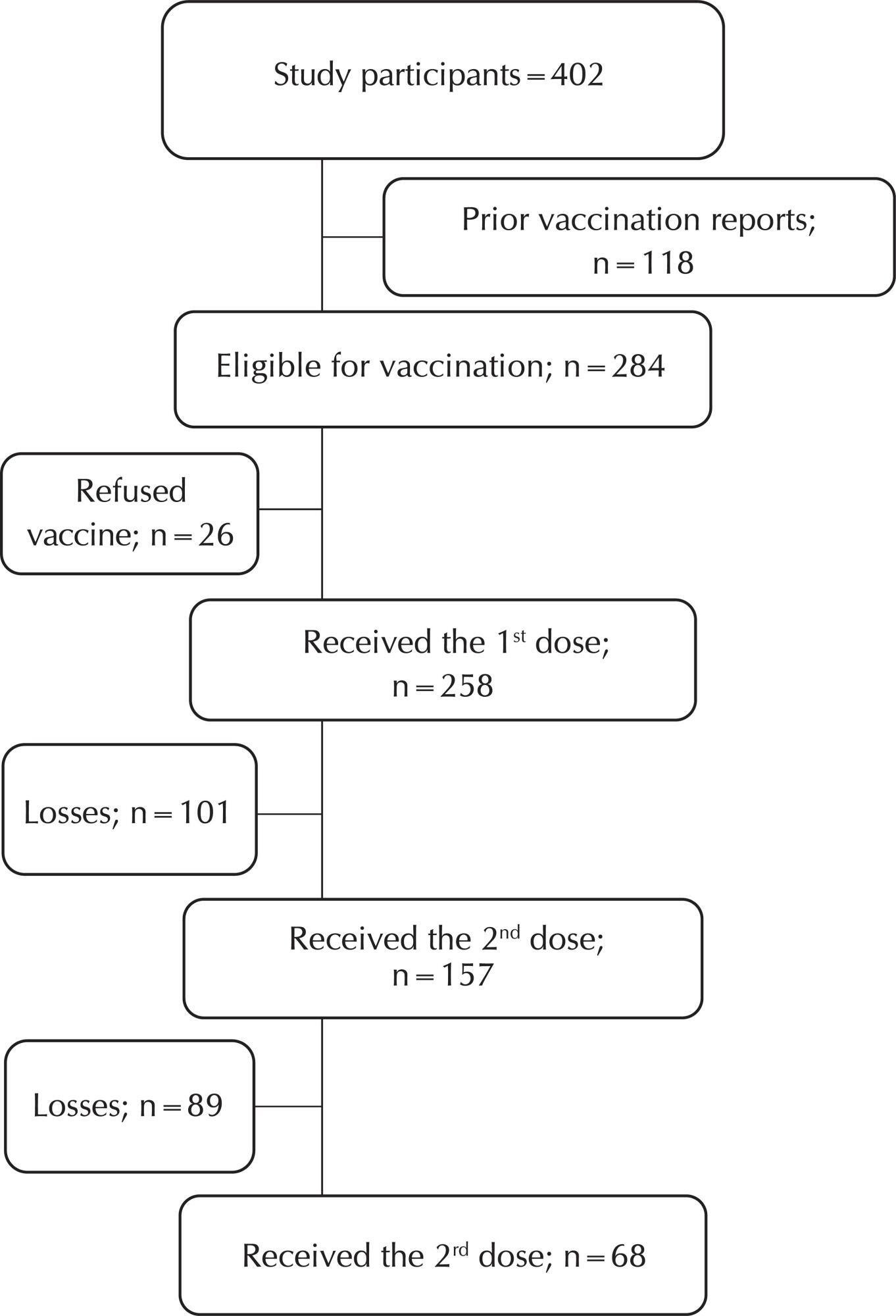
-
RESEARCH01-01-2017
Cost of nursing most frequent procedures performed on severely burned patients
Revista Brasileira de Enfermagem. 2017;70(3):481-488
Abstract
RESEARCHCost of nursing most frequent procedures performed on severely burned patients
Revista Brasileira de Enfermagem. 2017;70(3):481-488
DOI 10.1590/0034-7167-2015-0034
Views0See moreABSTRACT
Objective:
to identify the mean direct cost (MDC) of the most frequent procedures performed by nursing professionals on severely burned patients in an Intensive Care Unit.
Method:
exploratory-descriptive quantitative single-case study. The MDC was calculated by multiplying time (timed) spent by nursing professionals in the performance of the procedures by the unit cost of direct labor, and adding the costs of material and medicine/solutions.
Results:
a MDC of US$ 0.65 (SD=0.36) was obtained for “vital signs monitoring”; US$ 10.00 (SD=24.23) for “intravenous drug administration”; US$ 5.90 (SD=2.75) for “measurement of diuresis”; US$ 0.93 (SD=0.42) for “capillary blood glucose monitoring”; and US$ 99.75 (SD=129.55) for “bandaging”.
Conclusion:
the knowledge developed can support managerial decision-making, contribute to the efficiency distribution of the resources involved and, when possible, provide cost-containment or cost-minimization strategies without impairing the quality of nursing care.
-
RESEARCH01-01-2017
Nursing Activities Score and Acute Kidney Injury
Revista Brasileira de Enfermagem. 2017;70(3):475-480
Abstract
RESEARCHNursing Activities Score and Acute Kidney Injury
Revista Brasileira de Enfermagem. 2017;70(3):475-480
DOI 10.1590/0034-7167-2016-0266
Views0See moreABSTRACT
Objective:
to evaluate the nursing workload in intensive care patients with acute kidney injury (AKI).
Method:
A quantitative study, conducted in an intensive care unit, from April to August of 2015. The Nursing Activities Score (NAS) and Kidney Disease Improving Global Outcomes (KDIGO) were used to measure nursing workload and to classify the stage of AKI, respectively.
Results:
A total of 190 patients were included. Patients who developed AKI (44.2%) had higher NAS when compared to those without AKI (43.7% vs 40.7%), p <0.001. Patients with stage 1, 2 and 3 AKI showed higher NAS than those without AKI. A relationship was identified between stage 2 and 3 with those without AKI (p = 0.002 and p <0.001).
Conclusion:
The NAS was associated with the presence of AKI, the score increased with the progression of the stages, and it was associated with AKI, stage 2 and 3.
-
RESEARCH01-01-2017
Nursing appointment and cardiometabolic control of diabetics: a randomized clinical trial
Revista Brasileira de Enfermagem. 2017;70(3):468-474
Abstract
RESEARCHNursing appointment and cardiometabolic control of diabetics: a randomized clinical trial
Revista Brasileira de Enfermagem. 2017;70(3):468-474
DOI 10.1590/0034-7167-2016-0352
Views0See moreABSTRACT
Objective:
to verify the effect of nursing appointment on cardiometabolic profile of people with Diabetes Mellitus type 2.
Method:
randomized controlled trial, developed with 134 individuals chosen for two groups: intervention and control. The intervention consisted of three nursing appointments alternated bimonthly, with two phone calls, over five months. The control group received usual care offered by the Health Unit. Data were collected through semi-structured interviews before and after the intervention, in addition to conducting laboratory tests.
Results:
after the intervention, a significant difference was shown in the amount of glycated hemoglobin (p = 0.006) and in the systolic blood pressure (p = 0.031), which were higher in the control group.
Conclusion:
besides being low-cost and easy to develop on the monitoring routine of people with diabetes, the intervention performed influenced positively the biochemical profile.
-
RESEARCH01-01-2017
Terms of the specialized nursing language for the care of ostomates
Revista Brasileira de Enfermagem. 2017;70(3):461-467
Abstract
RESEARCHTerms of the specialized nursing language for the care of ostomates
Revista Brasileira de Enfermagem. 2017;70(3):461-467
DOI 10.1590/0034-7167-2015-0058
Views0See moreABSTRACT
Objectives:
to identify terms of the specialized nursing language for the care of ostomates from the literature of the area, and to map the identified terms with terms of the International Classification for Nursing Practice (ICNP®).
Method:
descriptive study of quantitative approach guided by the guidelines for the elaboration of terminology subsets of the ICNP®. The terms were collected in 49 scientific articles, extracted using a computational tool, selected according to the relevance for the theme, and normalized and mapped with the ICNP®.
Results:
20,668 terms were extracted. The standardization process resulted in 425 relevant terms (151 were constant in ICNP® and 274 were not contained in ICNP®), of which 154 were similar, 19 were more comprehensive, 50 were more restricted, and 51 were not in concordance.
Conclusion:
the use of standardized language can minimize the ambiguities and redundancies identified in the mapping. The existence of terms not in concordance with the ICNP® reinforces the need for constant updating of this classification.
-
RESEARCH01-01-2017
Validation of an instrument regarding nursing intervention in patients in vasoactive therapy
Revista Brasileira de Enfermagem. 2017;70(3):453-460
Abstract
RESEARCHValidation of an instrument regarding nursing intervention in patients in vasoactive therapy
Revista Brasileira de Enfermagem. 2017;70(3):453-460
DOI 10.1590/0034-7167-2016-0254
Views0See moreABSTRACT
Objective:
to validate the content of a Standard Operational Procedure, regarding nursing interventions in emergency patients treated with vasoactive drugs.
Method:
methodological study, carried out from December 2015 to January 2016. Content validity was determined by 16 experts (13 nurses, 2 pharmacists and one biomedical scientist), who judged it through a four-point Likert scale. The items were evaluated in terms of: feasibility, objectivity, simplicity, clearness, pertinence and accuracy. The Content Validity Index was applied, accepting the value ≥ 0.90.
Results:
two rounds of evaluation were required to achieve the minimum index. The items were reviewed regarding writing, dilution, indication and replacement interval. The instrument was validated with 33 items and with total Content Validity Index of 0.99.
Conclusion:
the instrument was considered appropriate, fractionally and globally, for nursing care for the patient treated with vasoactive drugs in emergency, in a safe and reliable way.
-
ORIGINAL ARTICLE06-14-2024
Mid-range theory of the nursing diagnosis Overweight
Revista Brasileira de Enfermagem. 2024;77(2):e20230372
Abstract
ORIGINAL ARTICLEMid-range theory of the nursing diagnosis Overweight
Revista Brasileira de Enfermagem. 2024;77(2):e20230372
DOI 10.1590/0034-7167-2023-0372
Views0See moreABSTRACT
Objective:
To build a mid-range theory for the nursing diagnosis Overweight in adolescents and young adults.
Methods:
A methodological study in the light of the theoretical frameworks of Roy and of Lopes, Silva and Herdman. A total of 3,925 articles were retrieved and assessed using the State of the Art Through Systematic Review software. The final sample consisted of 28 articles.
Results:
The findings converged to 3 essential attributes, 13 antecedents, and 7 consequences. A mid-range theory was built consisting of an illustrated diagram, 11 propositions, and 12 causal relationships.
Final considerations:
From the creation of the theory, it was possible to better understand the nursing diagnosis Overweight within the context of adolescents and young adults. Understanding nursing phenomena contributes to nursing science’s advancement and strengthening.
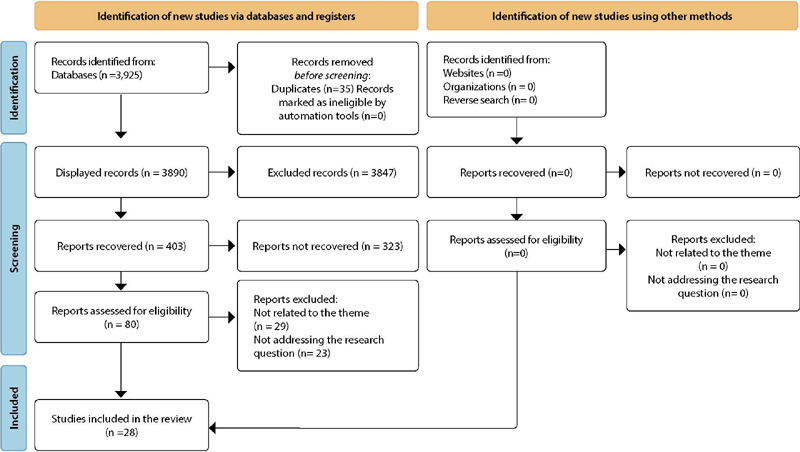
-
ORIGINAL ARTICLE06-14-2024
Cardiovascular Risk and Lifestyle: comparison between teaching workers in Portugal and Brazil
Revista Brasileira de Enfermagem. 2024;77(2):e20230354
Abstract
ORIGINAL ARTICLECardiovascular Risk and Lifestyle: comparison between teaching workers in Portugal and Brazil
Revista Brasileira de Enfermagem. 2024;77(2):e20230354
DOI 10.1590/0034-7167-2023-0354
Views0ABSTRACT
Objective:
Compare Cardiovascular Risk between workers in Brazil and Portugal who work in the teaching context and its relationship with Lifestyle and Common Mental Disorder.
Methods:
Cross-sectional study that compared the cardiovascular health conditions of teaching workers in Manaus (Brazil) and Coimbra (Portugal). The odds ratio between groups was estimated.
Results:
The differences were: Smoking and hypercholesterolemia in participants from Portugal. Hypertension, chronic disease, increased abdominal perimeter, common mental disorder, and absence from work in Brazil. The variables with the greatest effect for high cardiovascular risk were: Country-Portugal [17.273 (95%CI1.538-193.951)], sex-male [61.577 (95%CI5.398-702.469)] and smoking [593.398 (95%CI57.330-6.142.020)].
Conclusion:
The differences in risk between groups showed that participants from Portugal, men, with high blood pressure and/or smokers are the most vulnerable to having a cardiovascular event. There is a need for interventions to promote cardiovascular health in the workplace in both countries.
Keywords:Community-Based Participatory ResearchHeart Disease Risk FactorsLife StyleOccupational HealthUniversitiesSee more -
ORIGINAL ARTICLE06-14-2024
Functional performance assessment scale for children and adolescents with cancer: cross-cultural study
Revista Brasileira de Enfermagem. 2024;77(2):e20230331
Abstract
ORIGINAL ARTICLEFunctional performance assessment scale for children and adolescents with cancer: cross-cultural study
Revista Brasileira de Enfermagem. 2024;77(2):e20230331
DOI 10.1590/0034-7167-2023-0331
Views0ABSTRACT
Objectives:
to describe the methodological process of cross-cultural adaptation of the PlayPerformance Scale for Children to Brazilian Portuguese.
Methods:
methodological study of translation and cross-cultural adaptation in six stages: translation, synthesis of translations, back-translation, evaluation by a committee of judges, evaluation by expert nurses, and pretest. The agreement and representativeness of the items were assessed using the content validity index. A minimum value of 80% agreement was considered.
Results:
all stages of the translation and cross-cultural adaptation process were satisfactory. In the evaluation performed by the committee of judges, all items obtained agreement above 80%. Fifteen pediatric nurses conducted the content validation, suggesting necessary modifications for understanding and application. Thirty children and adolescents with cancer were assessed with the scale for the pre-test.
Conclusions:
the scale was cross-culturally adapted to Brazilian Portuguese. The need for psychometric testing in a consistent sample is emphasized.
Keywords:Cross-Cultural ComparisonNursing Methodology ResearchOncologyPediatric NursingPhysical Functional PerformanceSee more -
ORIGINAL ARTICLE06-14-2024
Meanings attributed to health-related quality of life by caregivers of adolescents with diabetes
Revista Brasileira de Enfermagem. 2024;77(2):e20230314
Abstract
ORIGINAL ARTICLEMeanings attributed to health-related quality of life by caregivers of adolescents with diabetes
Revista Brasileira de Enfermagem. 2024;77(2):e20230314
DOI 10.1590/0034-7167-2023-0314
Views0See moreABSTRACT
Objective:
to interpret the meanings attributed to the health-related quality of life by caregivers of adolescents with type 1 diabetes mellitus.
Methods:
qualitative, descriptive-exploratory study of 14 caregivers of adolescents with diabetes developed at the reference outpatient clinic for endocrine diseases in a city in the state of Paraíba. Interviews were performed between May and September 2021. Inductive thematic analysis of the empirical material, and its interpretation in light of the concepts of health-related quality of life and family functioning were performed.
Results:
the meanings attributed by caregivers to the health-related quality of life of adolescents converged on the feeling of being healthy, healthy eating, satisfactory family income, family involvement in care and effective access to the care network.
Final Considerations:
knowledge of these meanings enables health professionals to develop strategies that meet the unique demands of caregivers experiencing this diagnosis.
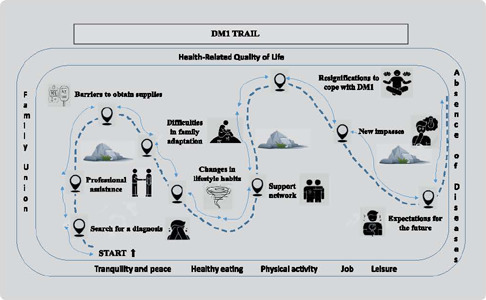
-
REVIEW06-14-2024
Critical analysis of the scientific production on Jean Watson’s Theory of Human Care
Revista Brasileira de Enfermagem. 2024;77(2):e20230231
Abstract
REVIEWCritical analysis of the scientific production on Jean Watson’s Theory of Human Care
Revista Brasileira de Enfermagem. 2024;77(2):e20230231
DOI 10.1590/0034-7167-2023-0231
Views0See moreABSTRACT
Objectives:
to analyze current scientific production on the use of the theoretical-methodological precepts of Jean Watson’s Theory of Human Care/Clinical Caritas Process.
Methods:
quantitative, exploratory, descriptive study using data from 1979 to 2023 in the Scopus database. Analysis was carried out using VOSviewer software.
Results:
the 73 studies included establish a network of collaboration among 221 authors from 155 institutions in 18 countries, who discuss the development of ethical behavior in nursing staff, through technical improvement, implementation, and validation of instrumental strategies capable of measuring and evaluating the quality of holistic and empathetic care. The Theory of Human Caring contributes to nursing training and care, and Process Clinical Caritas-Veritas is useful for the different possibilities of practice and education.
Conclusions:
it is important to strengthen with more empirical data a nursing work model centered on individual human care, supporting the evolution of scientific nursing knowledge.
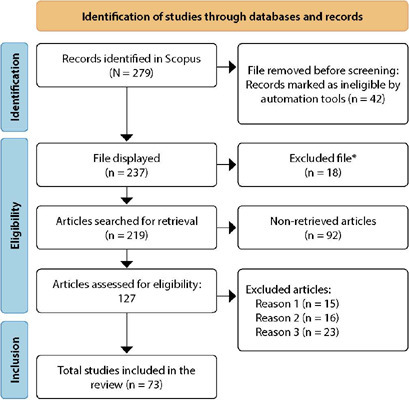
-
REVIEW06-14-2024
Primary health care professionals’ practice in the face of leprosy: a scoping review
Revista Brasileira de Enfermagem. 2024;77(2):e20230207
Abstract
REVIEWPrimary health care professionals’ practice in the face of leprosy: a scoping review
Revista Brasileira de Enfermagem. 2024;77(2):e20230207
DOI 10.1590/0034-7167-2023-0207
Views0See moreABSTRACT
Objectives:
to identify Primary Health Care professionals’ practice in the face of leprosy.
Methods:
a scoping review, carried out between November 2022 and January 2023, conducted according to the methodological structure proposed by JBI and checklist Preferred Reporting Items for Systematic Reviews and Meta-Analyses extension for Scoping Reviews in six databases and additional literature.
Results:
the sample consisted of 11 articles, published between 2008 and 2022. The findings were synthesized into three categories: Early diagnosis and timely treatment; Physical disability prevention; and Household and social contact surveillance.
Final Considerations:
there is a need to align the practices carried out with those recommended by the Brazilian National Program for Leprosy Control and Elimination, as some were not identified in studies, which implies losses to qualified assistance directed to patient demands, with a view to control and elimination of leprosy.
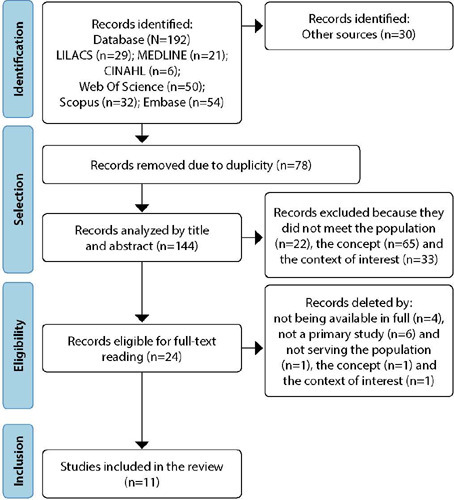
-
ORIGINAL ARTICLE06-14-2024
Validity of the TBApp mobile application for self-care management for people with tuberculosis
Revista Brasileira de Enfermagem. 2024;77(2):e20230195
Abstract
ORIGINAL ARTICLEValidity of the TBApp mobile application for self-care management for people with tuberculosis
Revista Brasileira de Enfermagem. 2024;77(2):e20230195
DOI 10.1590/0034-7167-2023-0195
Views1See moreABSTRACT
Objectives:
to describe the validity process of the TBApp mobile application for self-care management for people with tuberculosis linked to Primary Health Care.
Methods:
methodological research developed with ten expert judges, carried out virtually. The application was assessed in relation to content and technology quality in seven domains (objectivity; structure and appearance; relevance; functionality; reliability; usability; and efficiency), using an instrument with a Likert scale.
Results:
TBApp was considered valid, relevant, functional, reliable and effective by expert judges. The objectives, structure and presentation and relevance domains presented an overall Content Validity Index of 0.93, and the functionality, reliability, usability and efficiency domains presented characteristics and sub-characteristics values greater than 0.80.
Conclusions:
TBApp is a creative and innovative tool that can be used by people with TB and disseminated in the scientific community.
Search
Search in:
Nuvem de Tags
Aged (144) Atenção Primária à Saúde (239) COVID-19 (104) Cuidados de Enfermagem (269) Educação em Enfermagem (151) Educação em Saúde (139) Enfermagem (930) Estudos de Validação (131) Health Education (144) Idoso (208) Mental Health (149) Nursing (987) Nursing Care (306) Patient Safety (151) Primary Health Care (284) Qualidade de Vida (104) Quality of Life (106) Saúde Mental (145) Segurança do Paciente (150) Validation Studies (108)



